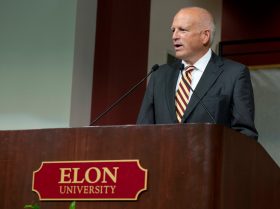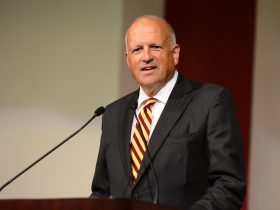President Leo M. Lambert previewed the 2015-16 academic year Monday in an annual address to faculty and staff at the start of Planning Week, and his remarks emphasized how Elon University is defined by the meaningful connections members of the campus community form with each other.

Lambert’s remarks in Alumni Gym kicked off Planning Week as educators prepare for the 2015-2016 academic year. He shared statistics about the high-impact learning practices for which Elon is renowned, and said that Elon is successful “because we value and place a premium on the quality and depth of human relationships at a time in the lives of young people when they are seeking mentoring, guidance and inspiration that leads to transformation.”
Other themes of Lambert’s address included campus social climate, the experience of African-American members of the campus community, creating relationships with community partners and growing relationships with Elon alumni, among other topics.
Additional excerpts from President Lambert’s address:
A focus on the campus climate
“Another dimension of focusing on an institutional culture that values human relationships is to continue to examine important questions about campus climate. In this regard, we have several ventures under way that I believe are tremendously significant to our future. The first centers around a newly appointed Presidential Task Force on Campus Social Climate and Out-of-Class Engagement that will be co-chaired by Associate Professor of Communications Naeemah Clark and Assistant Vice President of Student Life Jon Dooley. The task force is going to examine a number of broad and critical questions, such as:
- Does the university offer spaces and activities and policies that promote positive social opportunities and activities, including spaces for students who are not affiliated with fraternities or sororities?
- Do we have significant mechanisms in place for students to find their cohorts and engage peer groups for meaningful experiences?
- Are we doing enough to help students learn how to build the most positive peer-to-peer interactions as well as interactions with faculty and staff?
- Do we sufficiently illuminate the pathways that lead students to positive intellectual and personal journeys at Elon, helping them discover learning communities, clubs and organizations, and co-curricular experiences, that will dramatically broaden their intellectual and social perspectives?
- Are we holding fraternities and sororities sufficiently accountable to their founding values and the university’s mission?
- Are campus acculturation experiences, like Elon 101, optimally effective in meeting the needs of, and setting expectations for, students who are entering college in 2015? We know the first six weeks of college are tone setting. Are we setting the right tone?
The charge of this task force is broad and complex and intentionally reaches out to established working groups on campus, such as the intellectual working group, the residential campus committee, the mentoring committee, the alcohol committee, the Greek life committee, the student life committee, the first-year committee, and the inclusive community council. Other institutions that have taken on similar comprehensive studies of their student social climate and asked hard questions of themselves, places like Wake Forest and Bucknell, have gained fresh insights about how their institutions can be dramatically stronger and healthier places of student learning, development and relationship building.
The experience of black students, faculty and staff at Elon
“Another critical dimension about life at Elon, which has been under study for the past two years, is the experience of black students, faculty and staff at the university. We are living at a time in American history that requires us to engage in deep and thoughtful dialogue about race. Many of us are still shocked and reeling from the massacre in Charleston, South Carolina, this summer, which is still very much an open wound, following a continuing drumbeat of tragedy upon tragedy. And even closer to home, as we have witnessed, members of our own community have been targets of slurs for one reason only—because they are black.
“This summer I received an important task force report and thank co-chairs Dr. Randy Williams and Dr. Frances Ward Johnson and former co-chair, Melissa Jordan, and all members of the task force who have worked so diligently to craft a thoughtful assessment and comprehensive set of recommendations. I also want to express my appreciation to a group of African-American students, many in the class of 2015, who engaged with senior campus leadership to offer their own guidance and recommendations on how our community can be a stronger, safer, fairer, and more welcoming place for black and African American students. We cannot afford, at Elon, to have any important group feel at the margins of campus life, to be the victim of a racial slur shouted in a cowardly fashion from a passing car, or to waste precious intellectual and emotional energy on questions of whether Elon is a place where they can belong and thrive.
“We look forward to both discussing the recommendations of the task force report in this the community this fall, and, as was our practice with the LGTBQIA task force report, we will appoint an implementation team to oversee our progress. The senior staff of the university has already engaged with many of the task force recommendations in many areas of campus life, ranging from staffing in admissions, to training for campus safety and police, to rethinking about how we communicate Elon’s Honor Code, specifically in regards to racial bias, to enhancing philanthropic giving for endowed scholarships.
“We are committed to thinking carefully about how our corner of the world can make an important contribution to systemic change that is so much in need in our nation. Dean Randy Williams has often stated the key point that Elon is a place where every student should have the opportunity to thrive, not simply to graduate, or get by, or just persevere, but to thrive, to build a powerful and important set of relationships here on campus that will sustain them for their lifetimes. Each of us has a personal responsibility to study this task force report and to examine our own personal commitment to afford black students, faculty, and staff at Elon every opportunity to excel, to experience the full embrace of Elon as our valued and cherished colleagues, students, and friends. And we need to celebrate successes, such as the fact that our African American enrollment in the first-year class increased again this year and we have made strong progress in diversifying our faculty and staff workforce.
“We have to be invested for the long term. What a poignant moment at Commencement this past May, when Elon alumnus Eugene Perry of the class of 1969 received a standing ovation from the entire audience. It was only 46 years ago that Mr. Perry became the first African-American to graduate from Elon. We have come far, but we have much work to do and a journey in front of us. This is not easy work—and sometimes it is painful work—but we have to keep at it to work to create the university, and the world, that we will be proud for succeeding generations to inherit from us.”
Creating new relationships with community partners

“Even as Elon’s reach becomes increasingly national and international, I want to stress this morning how important it is that we maintain a strong relationship with our local community partners. In very real and important ways, the future health and progress of the Elon University community will be dependent on the quality of the schools our children attend, the quality of health care in our community, the vibrancy of the historical, cultural and artistic institutions surrounding us, and the care and attention that we pay to the most vulnerable members of our community who we must not forget to also count among our close neighbors.
“Civic engagement is a key dimension of Elon’s mission and one of our most cherished institutional values. I am proud of the many ways that our students, faculty and staff connect academic work and scholarship with thoughts and engaged community service.
“This year, we are taking a major step forward with the launch of two new programs to place recent graduates as Elon Community Impact Fellows in Alamance County. We are rightfully proud of our track record in preparing Peace Corp Volunteers to work all over the globe. I think of our Community Impact Fellows Program as a post-graduate, Peace Corp-like experience where recent graduates can practice their skills and knowledge as global citizens right here in our own backyard.
“Through a partnership with ARMC and Cone Health, four of these fellows have already been selected and are at work with the following health organizations: Healthy Alamance, Impact Alamance, Alamance County Health Department, and the Alamance Regional Medical Center. These young alumni are going to play a contributing role in improving health outcomes in our local community.
“And with the support of a grant from the William Kenan Charitable Trust, we will be launching in 2016 the Community Impact Fellows for Sustained Changed for Education Project. The fellows will be assigned to our neediest title one schools in Alamance County (Newlin Elementary, Andrews Elementary, Haw River Elementary and Eastlawn Elementary). These fellows will work to improve preparedness for kindergarten, especially among poor and minority children in Alamance County, and to broadly increase parental education regarding child development, early literacy and numeracy. In our view, investing in early childhood education and investing in community health is one of the smartest and most productive use of resources that we can imagine. I believe both of these programs will deepen our ties to local social institutions that are important to the quality of the community in which we work and live.”
The importance of alumni to Elon’s future
“I also want to continue to stress how important our alumni are to the future of this university and to applaud the many ways schools and departments are forming substantive partnerships with Elon alumni that, believe me, are going to pay great dividends in the years and decades ahead. The number of alumni volunteering their time and services to Elon reached 1,800 this year – six times as many as at the start of the Elon Commitment. And we continue to meet our alumni where they work and live around the world. The number of alumni-led regional chapters now stands at 32 (with chapters in places like London, Los Angeles, Chicago, Denver, and Dallas) – twice as many as we had five years ago. At a time when national alumni giving rates are declining, ours has risen from 16 percent to 22 percent since the start of the Elon Commitment and this year the senior class campaign reached a record 53 percent participation rate. In the year ahead we’re going to take steps to deepen our alumni programs and the experiences alumni have with Elon. I want to especially commend the substantive, meaningful, and inspiring alumni awards programs that have been launched by Elon College, the College of Arts and Sciences, the School of Communications, the School of Education, the Martha and Spencer Love School of Business, the School of Health Sciences and the School of Law.
“We will continue to expand academic integration in our alumni engagement efforts. Moreover, we will continue to include faculty in the Evening for Elon programs, we will launch several new academically focused networking receptions in key markets like New York, Washington, D.C. and Los Angeles. And, with your support, we envision further increasing the number of alumni who are invited into classes and events back on campus.
“While our alumni are not physically present on campus every day, they are full partners in our future and we have, and they have, a joint, huge stake in the continued flourishing of this university. I appreciate all of your efforts to build a premier alumni program at Elon that is going to help propel this university forward.”


